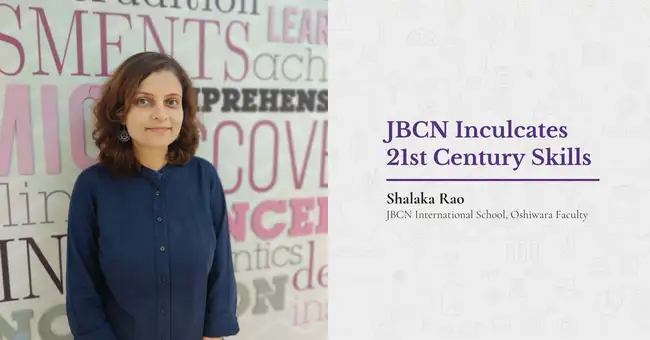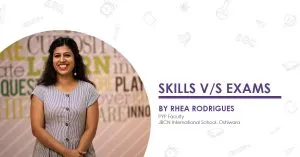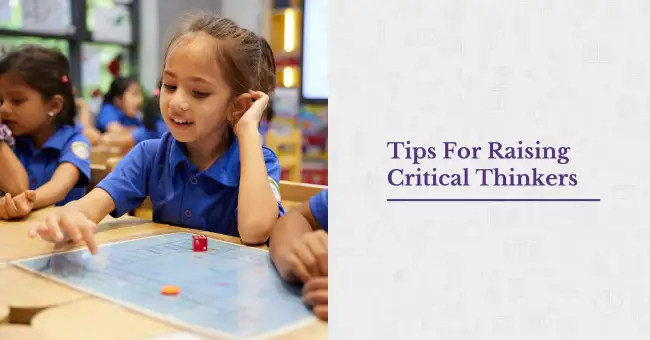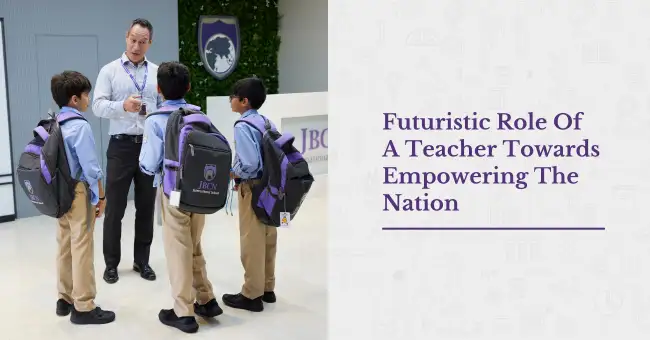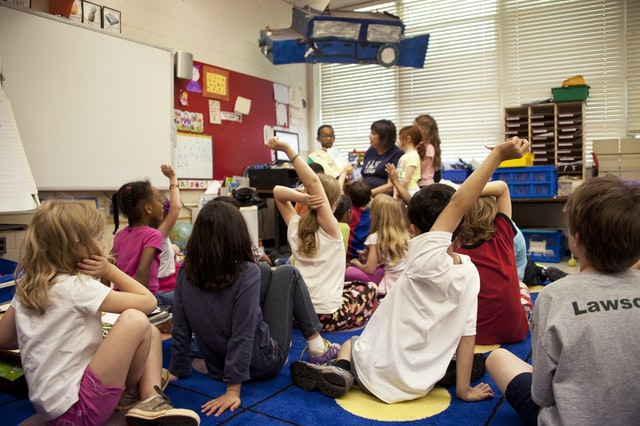
Just like plants need the right amount of sunlight, water, clean soil, and some nutrients in the soil for food. Our learners should be taught the art of listening, speaking, receiving and giving feedback and most importantly of asking questions.
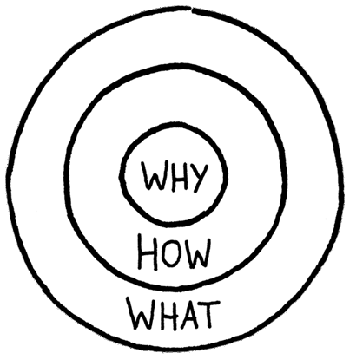 Image source
Image sourceInspired by the ”Golden Circle” - Simon Sinek’s work of starting with the WHY, let’s begin by inquiring into the purpose of “Questioning” in the process of teaching and learning.
Why Is Questioning Skill Important In The Teaching And Learning Process?
“If I had influence with the good fairy who is supposed to preside over the christening of all children, I would ask her gift to each child in the world be a sense of wonder so indestructible that it would last throughout life” (Rachel Carson 1965)The quote by Rachael Carson explains to us that a child’s world is full of excitement and wonder. To strengthen the natural instinct of wondering, questioning is an important skill to be developed in learning, a good question can open minds. It is a question that often leads us to wonder, reflect, discover and challenge new ideas, uncover new meaning by taking us from the known to unknown.
Asking questions is a worthy way of obtaining more information about a particular concept or idea, or simply starting a conversation and keeping it going. Those with good questioning skills are often also very good listeners as they spend more time absorbing information from others than sharing their own judgements and opinions. Questioning is at the heart of communication, it is an expansion of critical communication skills in children. A great question is equal to great communication hence questioning is the key mantra to successful communication.
Promoting learner questions in class is a significant role of an Inquiry teacher. They are always striving hard to get their learners to be questioners, who are thirsty to find out new information, critique about the world around them and find out more about who am I as a learner?
How Can Teachers Develop A Culture Of Questioning In Their Classrooms?
Nearly a century ago, John Dewey made a prescient observation about classroom culture and questioning that still holds true today:No one has ever explained why children are so full of questions outside of the school, and the conspicuous absence of display of curiosity about the subject matter of school lessons. Reflection on this striking contrast will throw light upon the question of how far customary school conditions supply a context of experience in which (questions) naturally suggest themselves.
(Boydston, 2008,p.162)
The real issue is in the classroom culture, here would point out that teachers have enormous power, their behaviour will determine an impact on the climate of questioning in the classroom. A teacher’s curiosity infects the entire classroom in a positive way, they need to model curiosity and foster an environment where learners feel safe and comfortable in asking questions. Thomas Kuhn said “The answers you get depend on the questions you ask.” Whilst it raises a dialogue or a conversation that goes back and forth between two or more people, this kind of collaborative communication will lead learners in deep thinking, allow them to reflect on their own learning and find constructive solutions to problems and issues around them.
What Can Teachers Do to Improve Questioning Skills in Learners?
Try these 5 Magical strategies -Question Cube -
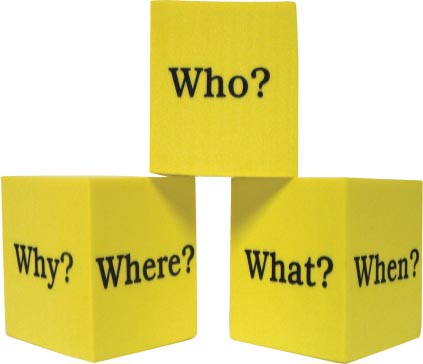 Image source
Image sourceThe question cube creates tension on the learners in framing critical thinking questions from a book you have read, as well as pictures of important things or main ideas. This strategy can be used in any subject focus.
See- Think- Wonder-
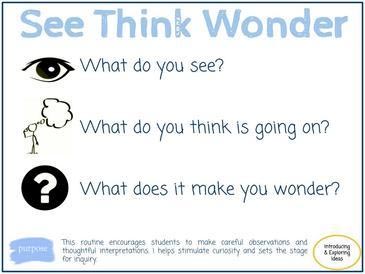 Image source
Image sourceVisible thinking Routine is simple yet a powerful tool to help learners generate questions. Beginning with a visual prompt, learners share their thinking at each step along the way before moving on to the next one. This facilitates the learners to build on the group's thinking and often results in deeper and meaningful discussions.
De Bono Six Thinking Hats –
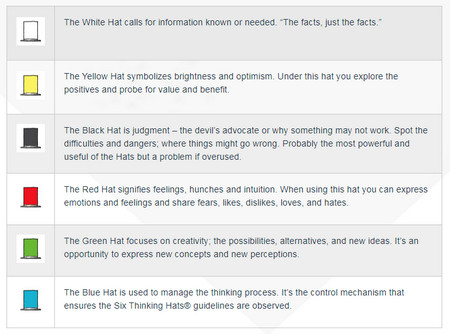 Image source
Image sourceUsing the mental metaphor from De Bono’s six thinking hats can help learners come up with the right questions and amplify their learning engagement.
Question Quadrant-
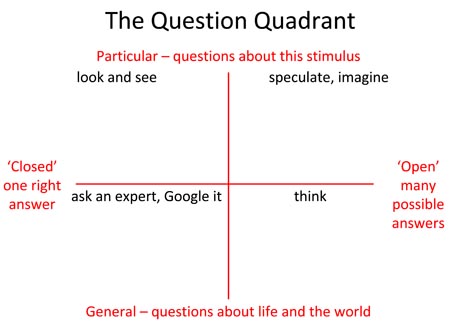 Image source
Image sourceTeachers often struggle with getting their learners to understand and ask good open ended questions. To get them to understand the different types of questions, the Question Quadrant is a tool first devised by Philip Cam (2006) while working with students and teachers in order to hone, sort and categorise learner questions. It is a tool which assists teachers to explicitly teach question types with the intention of using students’ questions to guide learning.
Question Wall –
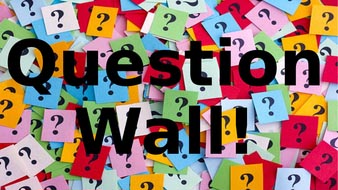 Image source
Image sourceQuestion wall is popularly known as a wonder wall or learning wall. A question wall is a space in the classroom where learners post their questions. In remote teaching we can design a virtual wall using EDTech tool Padlet or Wakelet. Teachers can incorporate this questioning strategy in their classes before, during and after a lesson. With question walls, learners can write their burning questions enabling them to safely express their wonderings. This strategy is particularly useful as it stimulates learners to think critically, boosts active learning and participation.
The importance of communication skills in children is key to being a successful communicator, an empathic leader and a contributive global citizen. The art of questioning is at the heart of the development of communication skills. Questions can be asked in a formal or an informal setting. Asking questions in the classroom or at home is a driving force of learning. It will always be an indispensable slice of every child's learning. Powerful questions can create an explosion in learning. Parents and teachers must encourage young learners to ask questions and provide them with an opportunity to investigate their own learning.
This requires a shift in thinking, parents and teachers must share the power of asking questions with the learners.
The important thing is not to stop questioning.
Curiosity has its own reason for existing.
-Albert Einstein
How Will You Encourage A Child To Ask Questions And Turn Their Wheel Of Learning?
Reference Sources:
The Power of Inquiry Kath MurdochEssential Questioning: Opening doors to student understandings Jay Mc Tighe and Grant Wiggins
Google Images
Written by: Ms. Nadia Patel
PYP Coordinator
JBCN International School, Oshiwara

